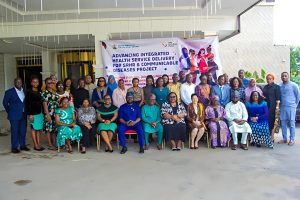Nigeria Launches Integrated Health Services to Enhance Outcomes for Vulnerable Populations
Abuja, In a strategic effort to strengthen health systems and improve access to essential services, Nigeria’s Federal Ministry of Health and Social Welfare (FMHSW) has launched a collaborative initiative to integrate sexual and reproductive health and rights (SRHR) with communicable disease interventions.
Bridging Service Gaps Through Coordinated Action
Led by the Family Health and Public Health Departments, this initiative is designed to overcome longstanding barriers that vulnerable populations face in accessing care such as fragmented services, limited coordination between health programmes, stigma, and low community awareness. By combining SRHR with communicable diseases interventions, the programme aims to deliver more accessible, efficient, and people-centered care thereby strengthening the integrated delivery of antenatal care, HIV, viral hepatitis, STI, adolescent health, and GBV services to streamline care for vulnerable groups, including adolescents, pregnant women, people living with HIV (PLHIV), and key populations. This initiative will also enhance referral systems to ensure seamless transitions between different levels of care and services, including community-based care. The approach seeks to deliver equitable, efficient, and people-centred healthcare, aligning with Nigeria’s commitment to universal health coverage (UHC).
Funded by the Global Fund to Fight AIDS, Tuberculosis and Malaria and technically supported by the World Health Organization (WHO), the initiative will be piloted in the Federal Capital Territory (FCT) and four states: Anambra, Ebonyi, Gombe, and Kwara. At the programme’s inception meeting in Abuja, Dr Binyerem Ukaire, Director of the Family Health Department, underscored the value of integrated services.
“By centring care around the needs of individuals, particularly women and adolescents, we make services more accessible, affordable, and effective,” she stated. “This initiative bridges critical gaps in our health system.”
Dr Godwin Ntadom, Director of the Public Health Department, highlighted alignment with the Ministry’s Sector-Wide Approach (SWAp), which promotes coordinated planning and service delivery. “Integration fosters a harmonised system, breaking down silos to achieve better health outcomes,” he said.
WHO Guidance and Global Standards
WHO provides technical support, adapting global best practices and tools to Nigeria’s context. The initiative contributes to WHO’s efforts to strengthen resilient health systems and advance Sustainable Development Goal 3 (health and well-being).
“Integrated care reduces fragmentation, enhances efficiency, and prioritises people,” said Dr Mya Ngon, Team Lead for Communicable and Non-communicable Diseases at WHO Nigeria. “This approach maximises resources to deliver improved outcomes.”
Additional partners, including the Clinton Health Access Initiative (CHAI) and Jhpiego, will support implementation through expertise in capacity building and innovative service delivery.
Community Engagement for Impact
Community involvement is integral to the initiative’s success. Community-based organisations, traditional and religious leaders, and youth groups will promote awareness, dispel misconceptions, and encourage health-seeking behaviours.
“Engaging communities builds trust and empowers individuals to take charge of their health,” noted Dr Ukaire. “This leads to higher service uptake and improved outcomes.”
Implementation and Monitoring
The initiative will be jointly coordinated by the Safe Motherhood Branch of the Family Health Department and the National AIDS and STI Control Programme (NASCP) under the Public Health Department. Implementation includes integrating service delivery at selected primary healthcare facilities, training health workers, updating clinical protocols, and harmonising monitoring tools.
A robust monitoring and evaluation framework will track service uptake, care quality, and health outcomes. Insights from the pilot phase will guide national scale-up
A Step Towards Inclusive Healthcare
By integrating SRHR with communicable disease programmes, Nigeria is advancing a more inclusive, efficient, and accountable health system. This initiative exemplifies a commitment to delivering equitable care, particularly for the most underserved, paving the way for sustainable health improvements across the country.
